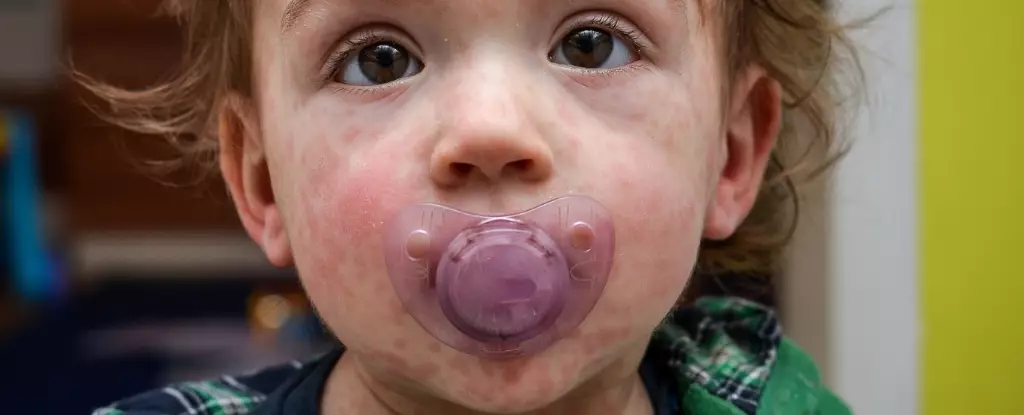The resurgence of measles is an unsettling reality as reports indicate a staggering increase in global cases, hitting over 10 million in 2023. This marks a troubling 20% rise from the previous year, spotlighting significant deficiencies in vaccination rates worldwide. According to a collaborative study from the World Health Organization (WHO) and the US Centers for Disease Control and Prevention (CDC), these findings serve as a grim reminder of the ongoing challenges in immunization efforts. Unfortunately, data suggests that only 83% of children received their first dose of the measles vaccine last year, a stagnation compared to 2022 and a notable decline from pre-pandemic levels. This under-performance in immunization has dire implications for public health.
Measles is not merely a common childhood ailment; it is one of the most transmissible viruses known. The recommended guideline is that at least 95% of the population must be vaccinated with two doses of the measles and rubella vaccine to establish herd immunity. The current vaccination levels fall alarmingly short of this target. With only 74% of children receiving their second dose, the implications become clear: we are perilously close to allowing a preventable disease to spiral out of control. WHO Director-General Tedros Adhanom Ghebreyesus reiterated the vaccine’s efficacy, emphasizing that it has been instrumental in saving lives over the last five decades. This fact underscores an urgent call to action: the need for global investment in vaccination programs.
The inequities in vaccine distribution are stark. In 2023, 57 countries reported significant measles outbreaks, a notable increase from 36 the previous year. Alarmingly, nearly half of these outbreaks occurred in the African region, where factors such as conflict, poverty, and inadequate healthcare systems severely undermine vaccination efforts. According to the study, all regions except the Americas experienced outbreaks, showing that vaccination coverage – or the lack thereof – is a pervasive issue across various socio-economic contexts.
Interestingly, while 107,500 measles-related deaths were recorded globally last year, this statistic reflects a decrease from the previous year. This can be associated with improvements in healthcare accessibility and nutritional status in certain regions where outbreaks surged. Still, these numbers reveal a harrowing truth: far too many children continue to fall victim to a disease that is wholly preventable.
Despite the alarming rise in cases, there remains a faint glimmer of hope. By the end of 2023, 82 countries reported having achieved or maintained measles elimination status. Brazil has recently reaffirmed its elimination of measles, reinstating the Americas as free from endemic measles. Yet, it is crucial to note that this progress is emerging against a backdrop of broader challenges, particularly in the African and Eastern Mediterranean regions.
The WHO and CDC have made an urgent plea for enhanced vaccination efforts, especially in areas afflicted by fragility and conflict. The global goal of eradicating measles as an endemic threat by 2030 is in jeopardy, necessitating heightened focus and resources to ensure comprehensive immunization coverage.
As we grapple with this escalating crisis, it is imperative that global health authorities coordinate effectively to address these daunting challenges. Investment in healthcare systems, particularly in underrepresented regions, is critical. The importance of equitable access to vaccines cannot be overstated. A collective response is essential to fortify immunization programs and ensure the safety of vulnerable populations, especially young children who bear the brunt of measles’ potentially devastating impact.
Public awareness campaigns must also emphasize the necessity of vaccinations, dispelling myths and misinformation that hinder vaccine uptake. If we can rally our resources, expertise, and commitment, there exists a genuine possibility of halting the current rise in measles cases and preserving the health and well-being of future generations. The time to act is now.


Leave a Reply